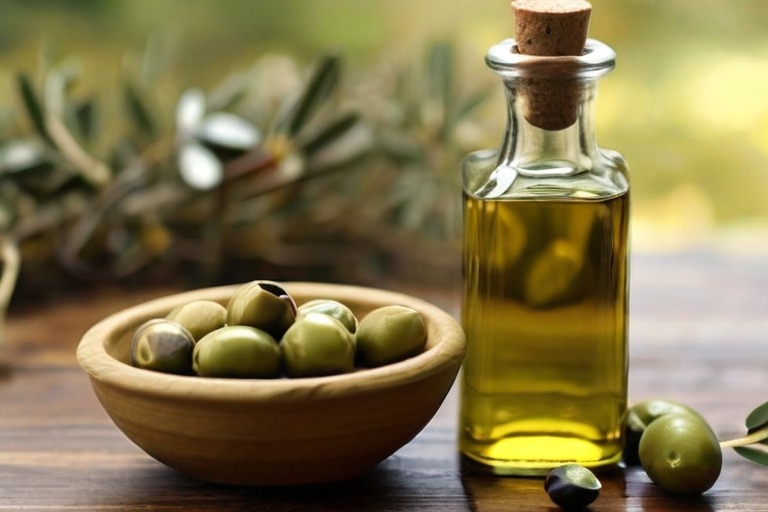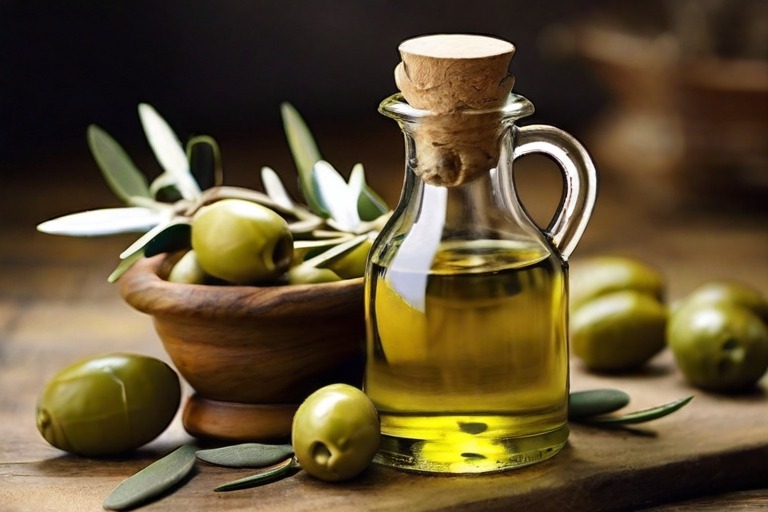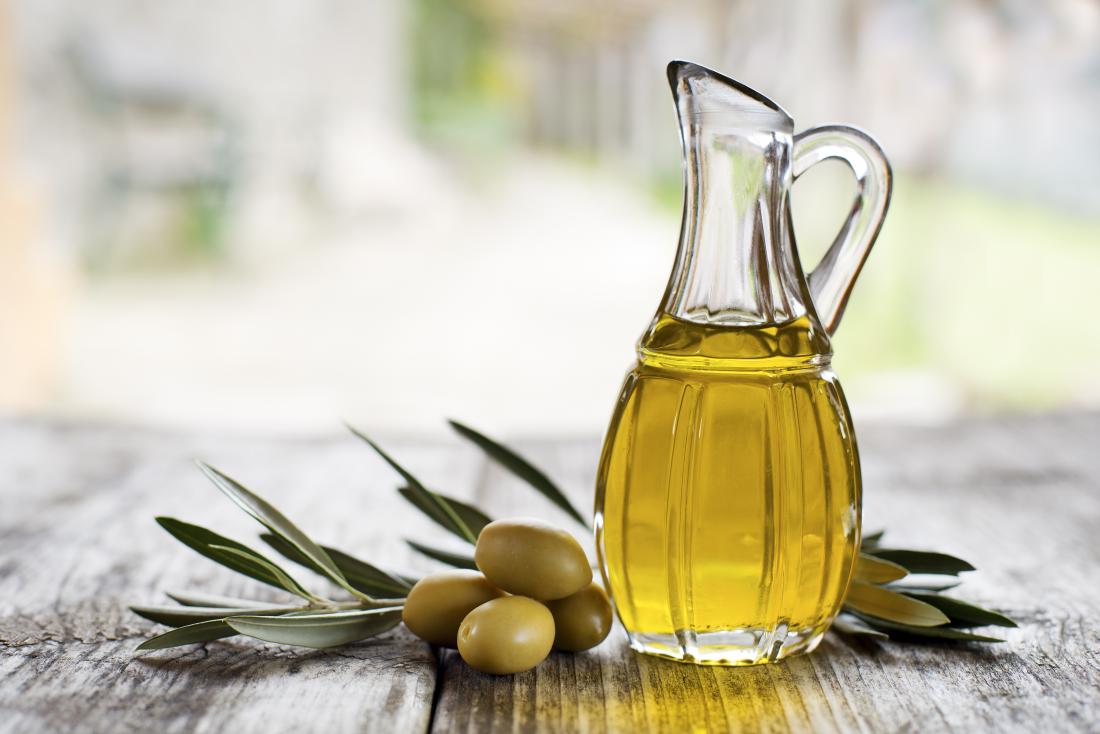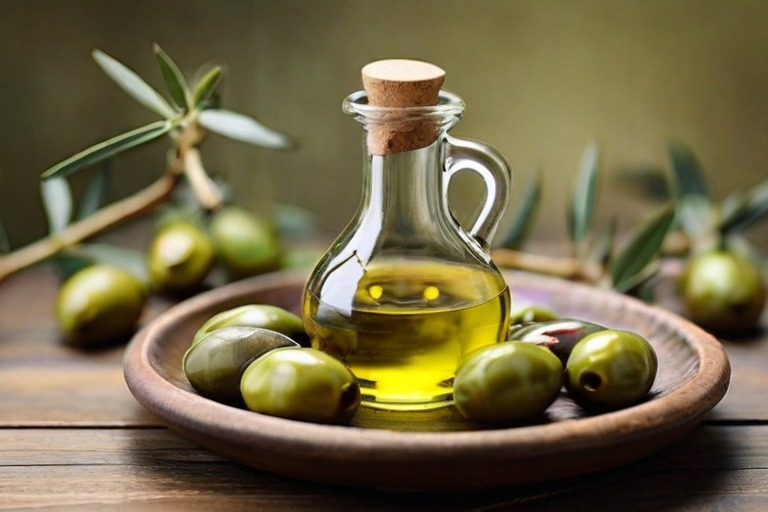Olive oil has been used for centuries as a cooking oil, medicine, and even as a fuel for lamps. It’s no wonder that this “liquid gold” has been called a “superfood.” But what exactly is olive oil, and is it really natural?
Olive oil is made from the fruit of olive trees. The olives are first crushed to release their juices, which are then purified to create the final product. Extra-virgin olive oil is the highest quality and purest form of olive oil; it has a fruity flavor and contains the most antioxidants. So, Is Olive Oil Natural? Yes! Olive oil is about as natural as it gets. It’s a simple product that contains nothing but olives and their juice. There are no additives or preservatives – just pure, healthy goodness.
Is Olive Oil Healthy? | Dr. Neal Barnard Live Q&A
There are a lot of conflicting opinions out there about whether or not olive oil is natural. Some people say that it is, while others claim that it isn’t. So, what’s the truth? As far as we can tell, olive oil is definitely natural. It comes from olives, after all! And olives are a fruit that grows on trees.
There’s nothing artificial or processed about them. Of course, not all olive oils are created equal. Some brands may use chemicals or other unnatural ingredients in their production process. But if you buy pure, extra virgin olive oil, you can be confident that you’re getting a product that is completely natural.
Is Olive Oil Bad for You
In short, no. Olive oil is not bad for you. In fact, it’s quite the opposite – olive oil is packed with healthy fats and antioxidants that can do wonders for your health. Let’s take a closer look at some of the ways olive oil can benefit your health. One of the most impressive benefits of olive oil is its ability to lower inflammation throughout the body. This is thanks to the presence of oleocanthal, a compound found in olive oil that has been shown to work similarly to ibuprofen in reducing inflammation (1).
If you suffer from joint pain, regular consumption of olive oil may help to reduce your symptoms. One study showed that people who consumed a diet rich in olive oil had less inflammation and joint pain than those who didn’t consume as much olive oil (2). Another benefit of olive oil is its positive effect on heart health.
Olive oil can help to lower blood pressure and LDL cholesterol levels while increasing HDL cholesterol levels (3, 4). All of these effects work together to keep your heart healthy and reduce your risk of developing heart disease.

How Much Olive Oil Per Day
When it comes to olive oil, the old adage “less is more” definitely applies. Though this healthy fat has plenty of benefits, you really don’t need that much of it to reap those rewards. In fact, consuming too much olive oil can actually have negative consequences for your health.
So how much olive oil per day should you be eating? The European Food Safety Authority (EFSA) recommends a maximum of 20 grams (about four teaspoons) per day for the general population and 10 grams (two teaspoons) per day for people with high cholesterol or heart disease. But these are just guidelines – ultimately, it’s up to you to decide how much olive oil you want to consume on a daily basis.
If you do choose to go above the recommended amount, make sure you do so in moderation. Too much olive oil can lead to weight gain and other health problems like inflammation and high blood pressure. And when it comes to cooking with olive oil, remember that less is definitely more – use just enough to coat your pan or food without drenching it in the stuff. By following these simple tips, you can enjoy all the benefits of olive oil without going overboard.
Extra Virgin Olive Oil Uses
Extra Virgin Olive Oil Uses There are many different ways that you can use extra virgin olive oil. This type of oil is great for cooking, baking, and even as a salad dressing. Here are some of the different ways that you can use extra virgin olive oil: Cooking:
Extra virgin olive oil is a great choice for cooking. It has a high smoke point, which means that it won’t burn easily. This type of oil is also healthy because it contains monounsaturated fats. Baking: You can also use extra virgin olive oil when you bake. It will add moisture to your baked goods and make them taste delicious.
Salad Dressing: Extra virgin olive oil makes a great salad dressing. Simply combine it with vinegar, salt, and pepper to create a tasty dressing. You can also add other ingredients like herbs or garlic to create a unique flavor.

How to Use Olive Oil
If you’re like most people, you probably think of olive oil as a healthy cooking oil. But did you know that olive oil has a long history of being used for medicinal purposes as well? Here’s a look at some of the ways you can use olive oil to improve your health:
1. Soothe ear infections. Olive oil has been used to treat ear infections for centuries. Simply warm some olive oil and then place a few drops into your affected ear. Then, place a cotton ball over the ear to keep the oil in and wait a few minutes before tilting your head to allow the excess oil to drain out.
2. Relieve constipation. Constipation is a common problem, but it can be very uncomfortable. If you’re looking for a natural way to relieve constipation, try using olive oil. Simply consume one tablespoon of olive oil each day until your symptoms improve.
3. Improve joint health. If you suffer from joint pain or inflammation, olive oil can help. The anti-inflammatory properties of olive oil can help reduce swelling and pain in the joints.
Types of Olive Oil
Olive oil is a staple in many kitchens, but did you know that there are different types of olive oil? Each type of olive oil has its own unique flavor and purpose. Here’s a guide to the different types of olive oil so you can choose the right one for your dish:
Extra Virgin Olive Oil: This is the highest quality olive oil. It’s made from pure, cold-pressed olives and has a fruity, peppery flavor. Extra virgin olive oil is best used for dipping, dressing, or finishing dishes.
Virgin Olive Oil: Virgin olive oil is also made from pure, cold-pressed olives. However, it has a slightly lower acidity than extra virgin olive oil. Its flavor is milder and smoother than extra virgin olive oil.
Virgin olive oil is best used for cooking or baking.
Refined Olive Oil: Refined olive oils are made from a blend of cold-pressed and processed olives. These oils have a neutral flavor and are perfect for high-heat cooking methods like frying or sautéing.
Olive Oil Benefits
Olive oil has been used for centuries as a healthy, natural alternative to other cooking oils. It is high in healthy fats and antioxidants, which make it beneficial for both the body and mind. Some of the health benefits of olive oil include:
- Lowering cholesterol levels
- Reducing inflammation
- Improving heart health
- Boosting cognitive function
Supporting weight loss In addition to these benefits, olive oil is also a delicious way to flavor food. It can be used in salad dressings, sauces, and marinades or simply drizzled over cooked vegetables or proteins.
Is Olive Oil Healthy
Yes, olive oil is healthy. It’s a great source of monounsaturated fats, which are associated with lower levels of heart disease and other chronic conditions. Additionally, olive oil contains antioxidants that can help protect against cell damage.
Extra Virgin Olive Oil Health Benefits
Extra Virgin Olive Oil (EVOO) has been shown to have many health benefits, including reducing the risk of heart disease and stroke. In addition, EVOO can help improve cognitive function and protect against Alzheimer’s disease. Other potential health benefits of EVOO include reducing the risk of cancer, osteoporosis, and type 2 diabetes.
The main active ingredient in EVOO is oleic acid, which is a type of monounsaturated fat. This healthy fat helps to lower LDL (bad) cholesterol levels and raise HDL (good) cholesterol levels. Additionally, oleic acid has anti-inflammatory properties that can help to protect against chronic diseases such as heart disease and cancer.
In terms of heart health, multiple studies have shown that consuming EVOO can help to reduce the risk of both heart disease and stroke. One large-scale study found that people who consumed at least two tablespoons of olive oil per day had a 21% lower risk of developing coronary heart disease than those who did not consume any olive oil at all. Another study found that those who consumed four tablespoons or more of olive oil per day had a 32% lower risk of suffering a stroke than those who did not consume any olive oil.
Cognitive function is another area where EVOO has been shown to be beneficial. One study found that older adults who consumed a Mediterranean diet rich in olive oil had better cognitive function than those who did not consume this type of diet. The Mediterranean diet has also been linked with a reduced risk for Alzheimer’s disease.
While more research is needed in this area, the evidence thus far suggests that consuming EVOO may help to protect against both age-related cognitive decline and Alzheimer’s disease. In terms of cancer prevention, there is some evidence that consuming EVOO may help to reduce the risk for certain types of cancer, including breast cancer and ovarian cancer.
Additionally, one large-scale study found that people who consumed at least two tablespoons of olive oil per day had a 16% lower risk of developing colorectal cancer than those who did not consume any olive oil at all. More research is needed in this area, but the available evidence suggests that consuming EVOO may offer protection against various types cancers.

Credit: www.medicalnewstoday.com
Is Olive Oil Healthy Or Not?
There are a lot of conflicting opinions out there about whether olive oil is healthy or not. Some people swear by it, while others avoid it like the plague. So, what’s the truth? Is olive oil healthy or not? Let’s take a closer look at the science to find out. First off, it’s important to note that not all olive oils are created equal.
There are different grades of olive oil, and the highest quality extra virgin olive oils are going to be the most healthful. Extra virgin olive oil is made from pure, cold-pressed olives and has a higher concentration of antioxidants than other types of olive oil. Now that we’ve got that out of the way let’s talk about some of the potential health benefits of olive oil.
Some studies have shown that consuming olive oil can help reduce your risk of heart disease by lowering bad cholesterol levels and protecting against oxidative damage (1). Olive oil may also help improve cognitive function and decrease your risk of Alzheimer’s disease (2). Additionally, this healthy fat can help stabilize blood sugar levels and promote weight loss (3).
Are There Chemicals in Olive Oil?
There are a variety of chemicals present in olive oil, depending on the type of olive oil and the process used to extract it. The main chemical components of olive oil are oleic acid, palmitic acid, linoleic acid, and alpha-tocopherol. Olive oil also contains other minor compounds such as squalene, sterols, lignans, and phenolic compounds.
The type of olive oil (extra virgin vs. refined) affects the chemical composition. Extra virgin olive oils contain higher levels of antioxidants and polyphenols than refined oils. The refining process removes these beneficial compounds from the oil.
Olive oil is a healthy fat that can be part of a healthy diet. It is high in monounsaturated fatty acids and low in saturated fats. Additionally, olive oil contains bioactive compounds that have been shown to have health benefits, including reducing inflammation and improving heart health.
Is Extra Virgin Olive Oil All Natural?
Extra virgin olive oil is certainly all-natural. It is made from the very best olives, which are cold-pressed to release their oil. This type of olive oil has a higher acidity than other types, but it is also packed with antioxidants and healthy monounsaturated fats. Extra virgin olive oil has many health benefits and can be used in cooking or as a dressing for salads.
What are Negatives About Olive Oil?
When it comes to olive oil, there are plenty of positive things that can be said about it. It’s a healthy cooking oil with plenty of benefits, including being packed with antioxidants and heart-healthy fats. However, there are also some negatives that should be considered when using olive oil, or any cooking oil for that matter.
One of the biggest potential negatives about olive oil is its smoke point. This is the temperature at which the oil starts to smoke and break down, releasing harmful compounds into the air. When olive oil is heated past its smoke point, it can release harmful chemicals like acrolein into the air.
These chemicals have been linked to respiratory problems and other health issues.
Another potential negative about olive oil is its cost. While it’s not necessarily the most expensive cooking oil on the market, it can still be pricier than other options like vegetable or canola oil.
Additionally, extra virgin olive oil has a lower smoke point than regular olive oil, so it may not be ideal for high-heat cooking methods like frying.
Finally, some people simply don’t enjoy the taste of olive oil as much as other oils. While its flavor can complement certain dishes nicely, others may find it overpowering or too intense.

Frequently Asked Questions [FAQs]
Is olive oil a natural product?
Yes, olive oil is a natural product extracted from the fruit of the olive tree.
What are the benefits of extra virgin olive oil?
Extra virgin olive oil contains high levels of antioxidants and healthy fats, which have been linked to numerous health benefits, such as reducing the risk of chronic diseases and supporting heart health.
What are the health benefits of extra virgin olive oil?
The health benefits of extra virgin olive oil include improved heart health, reduced inflammation, lower risk of stroke, and potential protection against Alzheimer’s disease.
What is the composition of extra virgin olive oil?
Extra virgin olive oil is composed of mainly monounsaturated fats, along with small amounts of polyunsaturated fats and saturated fats. It also contains antioxidants, such as vitamin E and phenolic compounds.
What are the risks of consuming extra virgin olive oil?
While generally considered safe and beneficial, excessive consumption of olive oil may lead to weight gain due to its high-calorie content. Additionally, some individuals may experience digestive issues if consuming large amounts of olive oil.
How may olive oil benefit health?
Olive oil may benefit health by reducing the risk of chronic diseases, improving heart health, protecting against inflammation, and potentially promoting brain health.
Conclusion
Olive oil is indeed a natural product derived directly from the olive fruit. Its extraction process is simple and does not involve any chemical treatments, making it a healthy and safe choice for your culinary delights. Rich in monounsaturated fats, olive oil offers numerous health benefits, from boosting heart health to reducing inflammation.
So, the next time you reach for a bottle of oil, consider grabbing olive oil. It’s not just a cooking ingredient; it’s a natural, healthy choice. So, we ask again – Is Olive Oil Natural? The answer is a resounding yes!
